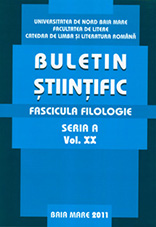Elemente de social rural în proza lui William Faulkner şi a lui Mihail Sadoveanu
Elements of the Rural Social in the Fiction of William Faulkner and Mihail Sadoveanu
Author(s): Carmen DărăbuşSubject(s): Literary Texts
Published by: Editura U. T. Press
Keywords: topos; archaic rhythms; type of humanities; melting-pot;
Summary/Abstract: Whether in a public or in a private, inward framework, the world is always in search of the meaning of life, aiming at putting order in the chaos of life, which brings on anguish. If, from a world-wide perspective, Sadoveanu stands for the national specificity, in tune with the archaic rhythms of the epic tones of the fictional Yoknapatawpha County, Faulkner represents the specificity of the world, viewed within a framework of detached irony. The American writer precipitates the stages altering the classical structure in concert with the new type of humanity which it’s just created in the transatlantic melting-pot. Sadoveanu’s topos is dominated by the presence of the peasant seen in close relationship with his environment; the rhythm it is slow, of an ancient accommodation of the people with the social and natural landscape. Thus, literary settings become a means of conveying a message about oneself so that literature, more than any other art, sharing the same themes, succeeded in communicating in a universal manner before the phenomenon of general globalization has done so. The modern human beings not any more organically connected, but just joined.
Journal: Buletin Stiintific, seria A, Fascicula Filologie
- Issue Year: XX/2011
- Issue No: 1
- Page Range: 197-203
- Page Count: 7
- Language: Romanian

